Claytone Sikasote
Findings of the IWSLT 2024 Evaluation Campaign
Nov 07, 2024Abstract:This paper reports on the shared tasks organized by the 21st IWSLT Conference. The shared tasks address 7 scientific challenges in spoken language translation: simultaneous and offline translation, automatic subtitling and dubbing, speech-to-speech translation, dialect and low-resource speech translation, and Indic languages. The shared tasks attracted 18 teams whose submissions are documented in 26 system papers. The growing interest towards spoken language translation is also witnessed by the constantly increasing number of shared task organizers and contributors to the overview paper, almost evenly distributed across industry and academia.
Zambezi Voice: A Multilingual Speech Corpus for Zambian Languages
Jun 13, 2023



Abstract:This work introduces Zambezi Voice, an open-source multilingual speech resource for Zambian languages. It contains two collections of datasets: unlabelled audio recordings of radio news and talk shows programs (160 hours) and labelled data (over 80 hours) consisting of read speech recorded from text sourced from publicly available literature books. The dataset is created for speech recognition but can be extended to multilingual speech processing research for both supervised and unsupervised learning approaches. To our knowledge, this is the first multilingual speech dataset created for Zambian languages. We exploit pretraining and cross-lingual transfer learning by finetuning the Wav2Vec2.0 large-scale multilingual pre-trained model to build end-to-end (E2E) speech recognition models for our baseline models. The dataset is released publicly under a Creative Commons BY-NC-ND 4.0 license and can be accessed via https://github.com/unza-speech-lab/zambezi-voice .
BIG-C: a Multimodal Multi-Purpose Dataset for Bemba
May 26, 2023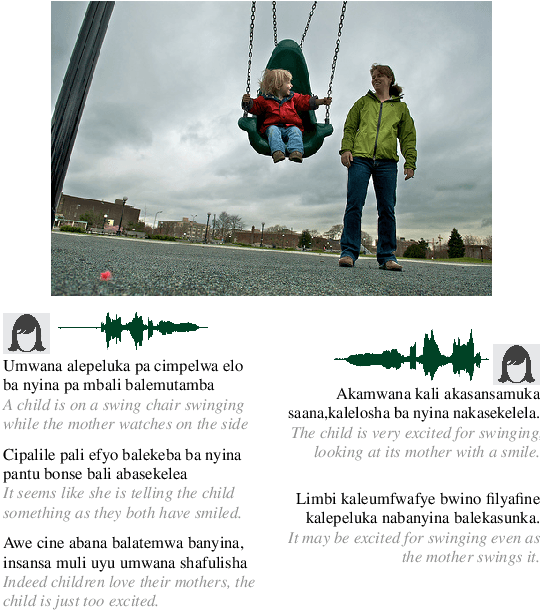
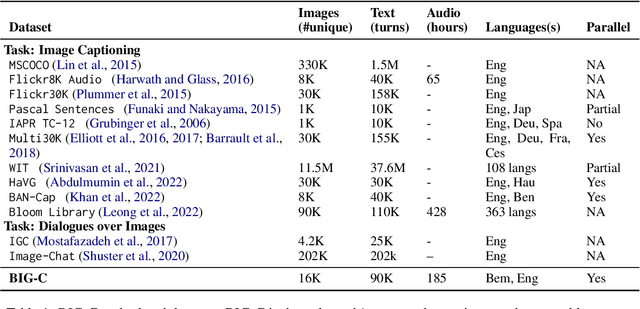
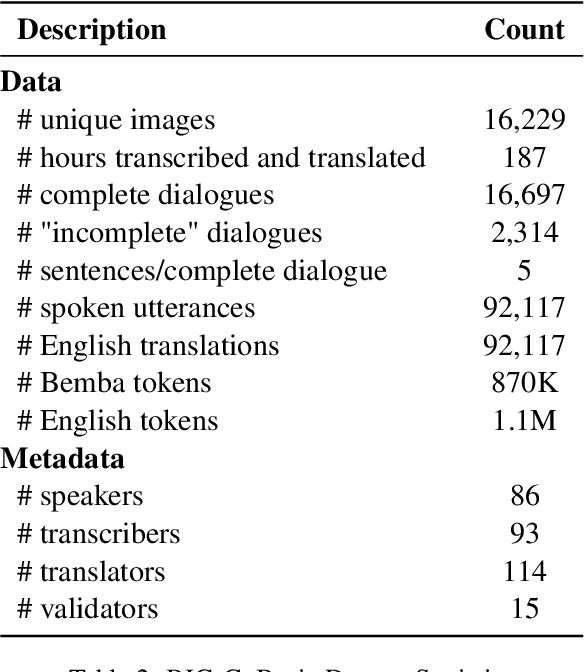
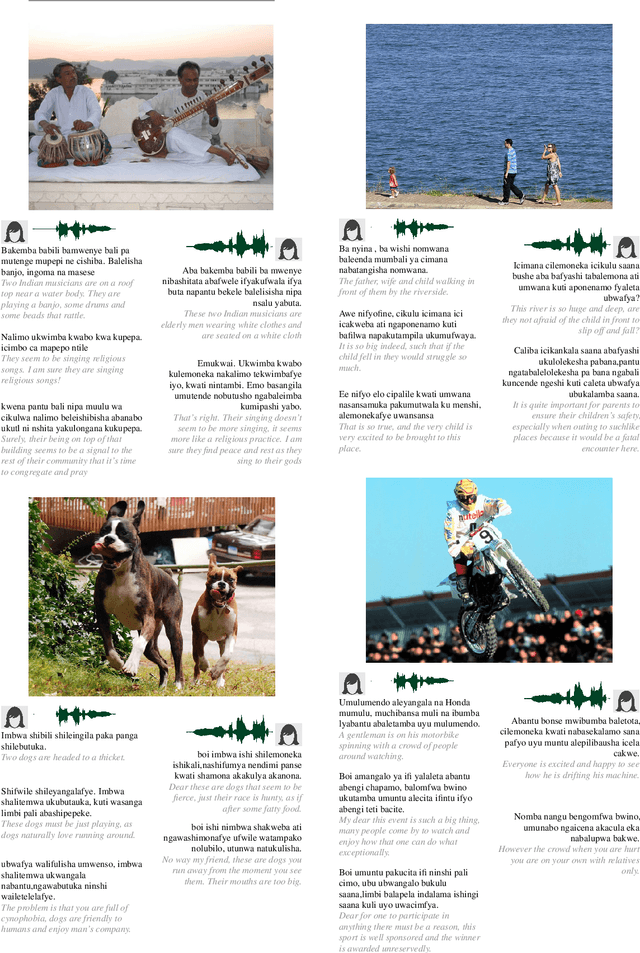
Abstract:We present BIG-C (Bemba Image Grounded Conversations), a large multimodal dataset for Bemba. While Bemba is the most populous language of Zambia, it exhibits a dearth of resources which render the development of language technologies or language processing research almost impossible. The dataset is comprised of multi-turn dialogues between Bemba speakers based on images, transcribed and translated into English. There are more than 92,000 utterances/sentences, amounting to more than 180 hours of audio data with corresponding transcriptions and English translations. We also provide baselines on speech recognition (ASR), machine translation (MT) and speech translation (ST) tasks, and sketch out other potential future multimodal uses of our dataset. We hope that by making the dataset available to the research community, this work will foster research and encourage collaboration across the language, speech, and vision communities especially for languages outside the "traditionally" used high-resourced ones. All data and code are publicly available: https://github.com/csikasote/bigc.
AfriQA: Cross-lingual Open-Retrieval Question Answering for African Languages
May 11, 2023



Abstract:African languages have far less in-language content available digitally, making it challenging for question answering systems to satisfy the information needs of users. Cross-lingual open-retrieval question answering (XOR QA) systems -- those that retrieve answer content from other languages while serving people in their native language -- offer a means of filling this gap. To this end, we create AfriQA, the first cross-lingual QA dataset with a focus on African languages. AfriQA includes 12,000+ XOR QA examples across 10 African languages. While previous datasets have focused primarily on languages where cross-lingual QA augments coverage from the target language, AfriQA focuses on languages where cross-lingual answer content is the only high-coverage source of answer content. Because of this, we argue that African languages are one of the most important and realistic use cases for XOR QA. Our experiments demonstrate the poor performance of automatic translation and multilingual retrieval methods. Overall, AfriQA proves challenging for state-of-the-art QA models. We hope that the dataset enables the development of more equitable QA technology.
Quality at a Glance: An Audit of Web-Crawled Multilingual Datasets
Mar 22, 2021
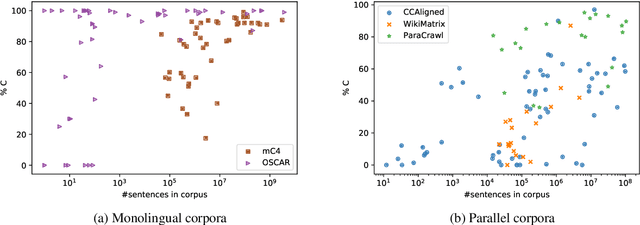
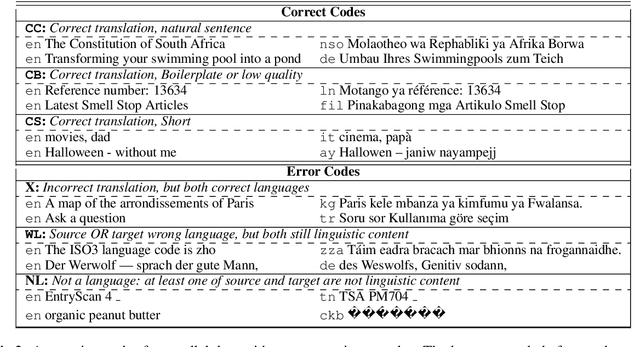
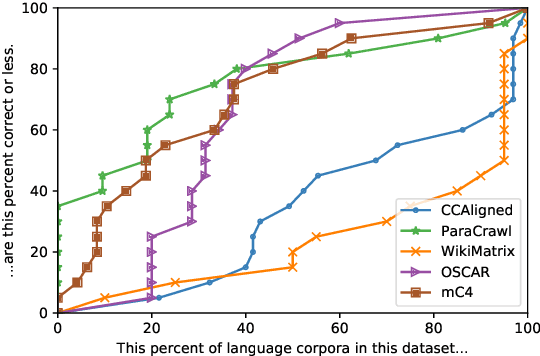
Abstract:With the success of large-scale pre-training and multilingual modeling in Natural Language Processing (NLP), recent years have seen a proliferation of large, web-mined text datasets covering hundreds of languages. However, to date there has been no systematic analysis of the quality of these publicly available datasets, or whether the datasets actually contain content in the languages they claim to represent. In this work, we manually audit the quality of 205 language-specific corpora released with five major public datasets (CCAligned, ParaCrawl, WikiMatrix, OSCAR, mC4), and audit the correctness of language codes in a sixth (JW300). We find that lower-resource corpora have systematic issues: at least 15 corpora are completely erroneous, and a significant fraction contains less than 50% sentences of acceptable quality. Similarly, we find 82 corpora that are mislabeled or use nonstandard/ambiguous language codes. We demonstrate that these issues are easy to detect even for non-speakers of the languages in question, and supplement the human judgements with automatic analyses. Inspired by our analysis, we recommend techniques to evaluate and improve multilingual corpora and discuss the risks that come with low-quality data releases.
BembaSpeech: A Speech Recognition Corpus for the Bemba Language
Feb 09, 2021



Abstract:We present a preprocessed, ready-to-use automatic speech recognition corpus, BembaSpeech, consisting over 24 hours of read speech in the Bemba language, a written but low-resourced language spoken by over 30% of the population in Zambia. To assess its usefulness for training and testing ASR systems for Bemba, we train an end-to-end Bemba ASR system by fine-tuning a pre-trained DeepSpeech English model on the training portion of the BembaSpeech corpus. Our best model achieves a word error rate (WER) of 54.78%. The results show that the corpus can be used for building ASR systems for Bemba. The corpus and models are publicly released at https://github.com/csikasote/BembaSpeech.
 Add to Chrome
Add to Chrome Add to Firefox
Add to Firefox Add to Edge
Add to Edge